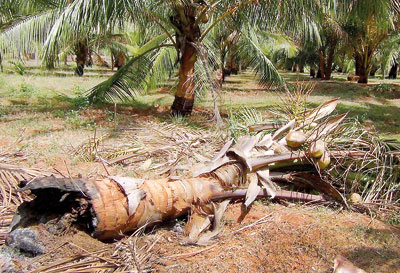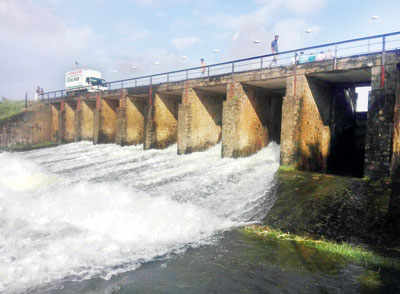News
Call to renovate tanks to avert drought disaster
Brace yourselves for hotter days to come as chilly mornings and heavy showers will gradually cease, weather experts predict.

If extreme weather continues, the country might be at a risk of a prolonged drought. Pic by K. Jayaratne
The country is experiencing the tail-end of the north-east monsoon (December to February) and the beginning of the inter-monsoon between March and April.
Meteorology Department Deputy Director Anusha Warnasooriya said from today onwards, there would be fewer showers, more evening thunderstorms and warm days. She asked the public to be careful of lightning strikes.
The current chilly weather is being carried by north-easterly winds from the Central Asian region passing the Himalayas, Prof. S.A. Norbert of Colombo University’s Geography Department said.
“This is the reason for chilly breeze and cold mornings,” he said. “There were reports of heavy mist from many areas especially from the north and east,” he said adding that this year, farmers in those regions who are growing paddy, tobacco and chillies have been complaining about heavy mist at dawn.
According to Prof. Norbert, emission through human activities such as industrial pollution has led to the increase of sulphur dioxide in the atmosphere, triggering unusual cold air.
Unlike the north-east monsoon, the inter-monsoon is accompanied by extremely warm and humid daytime weather and afternoon thundershowers.
“The temperature increases between 8.30am to 2pm, with thundershowers that have more thunder and lightning and less rainfall,” Prof. Norbert said.
The increased heat also is a result of the sun’s location directly over Sri Lanka early in April.
“If extreme weather is to continue, our country might be at a risk of a prolonged drought continuing in May, June, July and even after that. Last year, we didn’t see much rainfall even in the south-west monsoon or the second inter-monsoon,” the geography professor warned.
Prof. Norbert urged the government to take measures to renovate tanks in the dry zone as more warm days can result in severe drought hitting the agricultural sector.
“Despite us making recommendations, and organisations such as the World Bank funding projects to renovate and desilt tanks, little has been done to a satisfactory level. Rainwater harvesting and building of reservoirs should be carried out in addition to introducing crops that adapt to climate change,” he said.
The previous week’s heavy rains and strong winds in some drought-hit areas as well as other regions came from a suddenly-formed stormy condition (depression) that has now passed the country and is about 1000km away in the Arabian sea, Meteorology Department said.

Eight sluice gates of the Parakrama Samudraya in Polonnaruwa had to be opened as the reservoir reached spill level. Pic by Karu Gamage
Eight sluice gates of the Parakrama Samudraya in Polonnaruwa had to be opened as the reservoir reached spill level as a result of last week’s heavy rains.
According to the Disaster Management Centre, the depression that hit last week affected many areas, with strong winds and heavy rain causing damage in Moneragala, Trincomalee, Kegalle, Matara and Kandy.
Three fishermen from Maritimepattu in Mullaitivu went missing in rough seas, and the Meteorology Department issued maritime warnings.
“Indian Ocean-warming triggers cyclones and low pressure conditions. These are limited for few days but can cause widespread damage,” Prof. Norbert said.
Despite a few days’ rains, the Puttalam, Mannar and Kurunegala districts as well as the North Central Province continues to suffer the drought that has prevailed there since last year.

